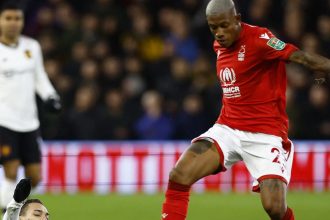The Red Devils' next opponents have created an unlikely dynasty and an unbreakable team spirit – with the help of a fighter jet pilot
There could not really be two more contrasting clubs than Manchester United and Bodo/Glimt, when it comes to size, history, financial muscle and recent achievements. The whole town of Bodo could fit inside Old Trafford and there would still be 20,000 seats to spare. And when the teams meet for the first time on Thursday, around 12 percent of the population (6500 fans) will be at the Theatre of Dreams for the biggest game in the club’s history.
The Norwegian club have spent most of that history outside of the top-flight and were not even allowed to compete to play in the top division until 1971 due to logistical difficulties. Until recently, they were regarded as an ‘elevator team’ going up and down the divisions. When they were in the top division, they had one of the smallest budgets, though money was not the only thing holding them back. Bodo is located 200 kilometres above the Arctic Circle, where there is hardly any daylight in the winter months. Norway's capital, Oslo, is a 16-hour drive away while the nearest city is at least an eight-hour drive away.
Despite all these competitive disadvantages, something incredible has happened in the last five years: Bodo/Glimt have become the top team in Norway, winning three out of the last four titles while being on course to win another next weekend. They have also staged some stunning campaigns in Europe, and they could teach this bloated and dysfunctional United team a thing or two…
Getty Destroying Mourinho
In their full debut campaign in continental competition back in the 2021-22 season, they reached the quarter-finals of the Europa Conference League, walloping Jose Mourinho’s Roma 6-1 in the group stage and destroying Celtic 5-1 on aggregate in the knockout stage, before they were eventually knocked out by Roma in an ill-tempered tie. They also reached the group stages of the Europa League two seasons ago, facing Arsenal, and the knockout rounds of the Conference League last term.
This season in the Europa League, they have already beaten Porto and Braga and go into Thursday’s game at Old Trafford above United in the standings. The match is set to be the biggest occasion in the club’s history and an emotional one too, as many of the staff and fans also support United. But the Red Devils should be taking an even keener interest in their opponents, as they could learn a lot from them.
"More than other clubs, we talk about values and working hard on our culture," CEO Frode Thomassen tells GOAL. "Most of all, it's a core group of people that have been together now for many years and have the same kind of ambition, the same kind of thinking, the hunger to achieve more. Bodo could inspire a lot of smaller clubs.
"In 2017, we had a budget of €4.2million (£3.5m/$4.5m), the third-lowest in the Norwegian league. We don't have a rich uncle or investors, we have built the sporting project over time."
AdvertisementGettyUnifying force
Thomassen became Bodo’s CEO in 2017 when they had just been promoted to the top-flight and when their average attendance was between 2,000 and 3,000. Now, more than 7,000 people watch each home game, accounting for 15 percent of the town’s population (around 53,000 people). Football is the unifying force for a region that was not just cut off from the rest of the country, but often looked down upon by the south.
Thomassen explains that when his father moved to Oslo, no one wanted to rent a room to someone from the north. "Bodo/Glimt has made people feel more proud of where we come from and our identity," he says. "So many people love football here. When people travel from the south up here for business, they want to talk about Bodo."
Around half of Bodo’s players hail from the north of Norway, giving the team a real sense of togetherness and identity. But the club has also turned into an attractive destination for players from across Scandinavia, despite the harsh weather and being isolated from everywhere else.
"People would look at Bodo on a map and see we were north of the Arctic Circle, so it’s not like people were rushing here before," admits Thomassen. "But we have done so well during the last four or five years so the opportunity to be a part of a team playing in Europe makes you also more attractive to the bigger clubs in Europe. So it’s not a problem for us anymore. I think most of the players in Scandinavia would like to play for us."
Getty Images SportNo breaks
There is one drawback of playing in Europe, though. The Norwegian season runs from March to November, so when the players and staff should be enjoying their time off, they are instead preparing for the biggest games of their lives. The expanded Europa League means that Bodo will be playing games until the end of January, two months after their domestic season has ended. If they reach the play-offs or last 16, they will get almost no break at all.
"That's a big discussion in Norway, something we actually feel heavily as a club," says sporting director Havard Sakariassen. "This is the fifth year in a row we're in Europe. We will play not just up until Christmas but also in Europe after Christmas, so there is no break for us, that's a bit crazy. Running the club the way we have been for the last six years, the fatigue is massive, not just for the players but also for the staff."
Adopting a schedule in keeping with the rest of the continent would help Bodo, but is unworkable for the other teams in Norway, particularly those in the lower leagues, due to the harsh winter weather. "Maybe it's impossible to do it. But for Bodo/Glimt and the teams competing in Europe it would be a great thing if we could turn it around. The load is massive and over the years it's quite… It's great fun, we're privileged, but it would be nice to have some breaks some time."
Getty'We attack things'
A key element of Bodo’s success has been the attacking style of play they adopted in their second season back in the top-flight. Thomassen explains how the change in style came about: "We drew 14 games the previous season. We weren’t an attacking team, we were focusing on defence and just counter-attacking. But I think the coaches did a really fantastic job from 2018 to 2019. We got more possession oriented, dominating the game. It was a big change in playing style and in 2019 we finished second and then the journey started. I think that the change between 2018 and 2019 was really important."
Bodo won their first-ever league title in 2020, in the midst of the Covid-19 pandemic. "When other clubs or businesses were putting on the brakes, we put on the gas," Thomassen adds, beaming with pride. "We were training under strict controls as we had to, but then we travelled to Spain, worked very hard in that period, and then the league started up that year we won games 4-0, 5-0 and 6-0. We beat every record in Norway. How we attacked the pandemic and how we worked during that period was a part of the success story we are building now. We challenge things, we think differently, we attack things. We do not copy other clubs."






